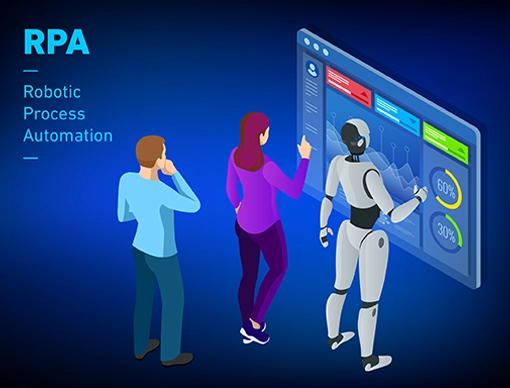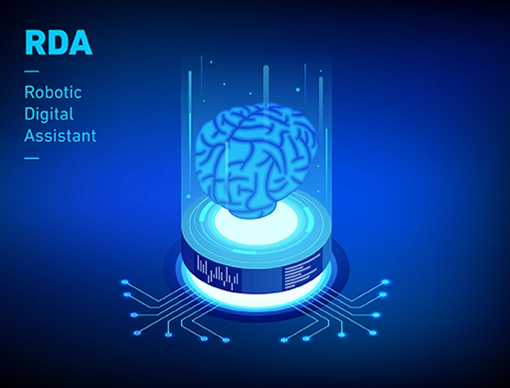What is Robotic Process Automation?
What is Robotic Process Automation?
You may design your robots as both "RPA", that is, Digital Employee, and "RDA", that is, Digital Assistant. Robots designed as RPA can conduct your business processes end-to-end in a human-independent manner while robots designed as RDA can work with humans in front office activities.

Digital Employee
Robotic Process Automation (RPA)
RPA Robots
- RPA robots are our digital employees with the ability to work in the background.
- They have their own unique ID, password and e-mail addresses.
- They can automate your rule-based, repetitive processes without the need for a human.
- They reduce costs, eliminate errors and create added value.
- They can be triggered and work instantly, on a future date or periodically.

Digital Assistant
Robotic Desktop Automation (RDA)
RDA Robots
- RDA robots are our digital assistants that can work in front office activities.
- They need an employee to complete a defined job.
- They advance and complete the defined work in line with the answers to be received from the employee.
- Digital Assistants assist working people and work on the computer.
- They increase productivity, eliminate errors and create added value.
What is the difference between a Digital Employee (RPA) and a Digital Assistant (RDA)?
- RDA needs employees to complete a defined job. It advances and completes the defined work in line with the answers it will receive from the employee.
- RPA, on the other hand, completes a job defined for it without the need for any employee. That’s why we call RDA “Digital Assistant” and RPA “Digital Employee”.
- “Digital Assistant” helps people who work, and works on a computer.
- “Digital Employee” is defined as an employee within a department or company. It completes 100% of the job assigned to it through the server.
Operations Assumed by RPA Today
Turkcell Global Bilgi undertakes businesses in various fields from RPA finance unit to purchasing, from logistics sector to tourism sector.
Featured Operations by Departments:
- Finance: Purchasing, order management, invoice generation, processing and control of related systems, management reports, collection control and alarm generation, tax planning.
- Purchasing: Making supplier definitions. Price comparison, reporting and alarm generation. Follow-up of supplier payments and PO transactions, creation and sending of delivery documents and updating of systems, follow-up of contract periods.
- Human Resources: Starting and quitting work, CV scanning, payroll production, employee performance evaluation and reflection of additional benefits to employee wages, leave and report processes.
- Marketing: Monitoring of social media channels, market and competition research.
- Sales: Processing and editing customer information into the system, automatic proposal creation.
- Supply Chain: Preparation of the shipment order, processing of the waybill and invoice information into the stock management system, return management.
- IT: System control, inspection of licensed software, management of servers and applications, user identification and password operations, installation of related software on new devices.
Featured Operations by Sectors:
- Cargo: Transportation planning and tracking, billing processes, collection, 3rd party carrier management, customer communication, access to corporate customer portal, purchasing and inventory processes.
- Tourism: Reservation, competitor price analysis, regulatory compliance processes, reporting and customer management.
- Media & Broadcast: Metadata update, content creation, device activation, grouping files and emails.
- IT: Software function testing, user operations, customer service and support.
- Audit: Data analysis, comparison, approval and reconciliation.
- Bank: Credit transactions, supplier payments, credit card transactions, fraud control, data migration.
- Insurance: Request/Complaint processes, regulation follow-up, proposal generation.
- Health: Patient procedures, appointment scheduling, complaint management and auditing.
- Production: Raw material tracking, management reports and data processing, after-sales support, compatibility of ERP and other systems, information exchange between non-integrated systems.
- Retail: Sales and business unit analysis, Supply-Demand planning, product categorization, after-sales support services, supply chain operations.
- Fuel & Energy Sector: Station account management, procedural operations, meter reading verification.
- Telecommunications: Go to market strategy, support processes, integration into applications.
- Customer Services: Data management, cost control, call center processes.
RPA Usage and Considerations
- With Turkcell Global Bilgi RPA, your digital employees can work very quickly 24/7. In this way, you provide a cost advantage of up to 80% in your business processes.
- Thanks to RPA, you can digitize your processes and have the opportunity to improve your business processes.
- Digital employees do the work defined for them with “Zero Error”.
- It should be remembered that digital employees do what they are defined to do. Definitions to be made for digital employees should be rule-based and complete. If there has been a change in business processes over time, the definitions of digital employees must be updated.
Purchasing and Pricing
You can either buy our Turkcell Global Bilgi RPA/RDA product with a cloud structure, or you can buy it as on-prem if you want to use it over your own servers. You can contact us for detailed information.
Installation and Usage
Whether you have a “Digital Employee (RPA)” or a “Digital Assistant (RDA)”, the issues to be considered for installation and efficient use are as follows:
- Preliminary Analysis: Identifying processes suitable for RPA or RDA and analyzing the benefits of meeting these processes with robots.
- Design: Defining the determined processes to robots, that is, creating their scenarios.
- Performance Follow-Up: The performance of the robots the work processes of which are defined and any error notifications should be regularly monitored from the management panel.
- Evaluation: The benefits of robots after their work should be measured. From the Turkcell Global Bilgi RPA/RDA product management panel, you can access the benefits provided by each robot after the work process it has completed.
Turkcell Global Bilgi RPA/RDA Features
Our experience as Turkcell Global Bilgi in digital transformation and process consultancy, which is indispensable for the use of RPA:
- 100% success in POCs, the ability to act flexibly in the demands of our customers and to make new developments quickly.
- Ability to import text, images and tables from PDF. Ability to process the imported table as a table in Excel.
- Monitoring the scenario (work description) of the active robot from the management panel.
- Optical character recognition technology.
- High processing capacity in corporate applications.
- Ability to access Google, Amazon, Microsoft and other web services.
- Queue management, Record Play, Method and ROI calculation features.